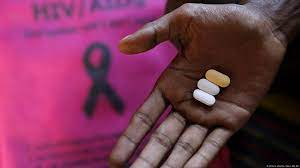Thousands of Kenyans living with HIV can breathe a sigh of relief as the government moves to secure enough antiretroviral (ARV) drugs to last for at least 11 months.
Health Cabinet Secretary Deborah Barasa assured the country that there are currently five months’ worth of the commonly used ARV known as TLD, a combination of Tenofovir, Lamivudine, and Dolutegravir, used by more than 92 percent of those on treatment.
“There are two million packs of TLD at the Kenya Medical Supplies Authority (Kemsa) and the subcontracted distributor, Mission for Essential Drugs and Supplies (Meds), translating to 4.7 months of stock,” she said.
She further revealed that an additional 4.8 million packs will arrive by June, pushing the stock to an estimated 11 months’ supply.
Kenya has long relied on foreign aid to support its HIV treatment program, with significant funding coming from the US President’s Emergency Plan for Aids Relief (Pepfar) and the Geneva-based Global Fund.
However, funding has faced disruptions in recent years, raising concerns over stockouts of life-saving drugs.
Despite the uncertainty, Barasa expressed confidence that Kenya will continue to provide uninterrupted treatment.
“Addressing these issues requires integrating HIV patients into the national health insurance scheme to ensure swift distribution of essential commodities,” the CS said.
On Friday, she flagged off ARVs meant for more than one million Kenyans from Meds’ Nairobi warehouse.
For children living with HIV, Barasa noted that Kenya has enough supplies of Abacavir/Lamivudine, which is administered with Dolutegravir tablets as the first-line treatment.
“Currently, Kemsa has more than 326,000 packs, which is enough for over seven months,” she said.
An additional 18 months’ worth of the drug has been ordered, with deliveries expected from June 2025.
Testing remains crucial in HIV management, and Barasa reassured Kenyans that the country has enough test kits.
There are currently 8.3 million Trinscreen tests, translating to a 10-month stock, 565,575 One Step tests (21.8 months’ stock), and 348,770 First Response tests (21 months’ stock).
Kenya also has 446,436 viral load test kits, which will last for 3.5 months.
CS Barasa said the ministry is fast-tracking the delivery of pending Alinity and Roche reagents by April to ensure continued testing services.
Beyond HIV medication, the government is also ensuring continued availability of other critical health commodities.
Kenya has 1.6 million condoms in stock following the recent distribution of over nine million pieces to health facilities.
Kemsa CEO Dr. Waqo Ejersa highlighted that Friday’s distribution included drugs for tuberculosis and malaria, which remain major health challenges in Kenya.
“Kenya records over 140,000 TB cases annually, and the malaria drugs being dispatched will help high-burden regions, particularly Western Kenya, the Lake Region, and the Coastal areas,” Ejersa said.
For Kenyans relying on these essential drugs, the assurance of a steady supply brings much-needed relief, with hopes that no patient will be left without treatment.
